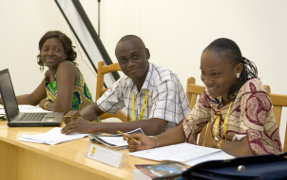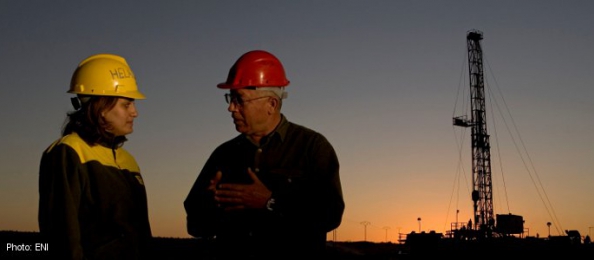Eni’s Cooperation Model for Sustainable Development
Multinational companies face huge challenges in countries they operate in, from human rights to the growing need for transparency and responsibility, from respect for the environment to the fight against poverty and the promotion of fair labor practices. Oil and gas companies operate in some of the most challenging places on earth, where they can have an important impact on local communities and on the environment due to the nature of their operations. Furthermore, they manage energy resources that are deeply connected to the economy of a country, and they cope with a public sector that often looks for the support from the private sector to guarantee an improvement of development standards.
Companies are thus receiving more and more attention from the market, international and local institutions, as well as civil society with regard to their impact, whether positive or negative, on the territories in which they operate. International bodies, such as the UN, are trying to establish private-public partnerships in order to meet their development goals. This paper describes the attempts Eni has made to build a multilevel cooperation model, meeting the principles and goals of the Global Compact.
Eni is the seventh largest international oil and gas company based on proven reserves and production. The company differs from the other major companies due to the greater impact of downstream gas activities in its portfolio, as it is the leading refining operator in the Mediterranean basin. The net sales from operations in 2009 were €83.23 billion with a hydrocarbon production of 1.769 million barrels per day.
Genuine respect for other cultures
Eni was created in 1953 as an Italian national oil and gas company, and in 1992 it was turned into a public energy company. Its origin are strictly connected to the life and destiny of one man, Enrico Mattei. He was one of the first Italians to develop a frontier business mentality and a genuine respect for other cultures. He had grasped that no international strategy would be possible without extensive knowledge of the individual countries Eni was intending to explore. Eni’s divergence from normal practice was an exception in international business, so much so that, at times, it seemed an affront to common sense.
In 1957, an agreement was made to set up the Italo-Iranian company Sirip. The Italian company agreed to fund exploration while Sirip agreed to develop and exploit any reserves that were found. An additional clause stipulated that 50% percent of Sirip’s net profits would go to the Iranian government, and the other 50 percent would be divided equally between Eni and the National Iranian Oil Company. The result was that for the first time an oil-producing country secured for itself a profit of around 75 percent, significantly better than the 50-50 formula already regarded as “revolutionary,” and it was also actively involved in the production process. This type of agreement has come to be known as the Mattei Formula.
The legacy of Enrico Mattei is a real intangible value for the company, especially for its way of establishing dialogue with the countries it operates in. CEO Paolo Scaroni recently affirmed that “In Eni, I was taught to remember that oil is not ours, it is theirs. This has always been one of the pillars of our strategy. If we work together, there will be enough wealth for everybody.” The spirit of the Mattei Formula is currently applied through Memorandum of Understandings and Agreement Protocols, which Eni signs with institutions and nonprofit organizations in its operating countries to set principles and goals concerning the economic, industrial, and social development of the country.
The strategic objective is to operate within the country as a Sustainable Development Agency and as a Structural Fund for Sustainability, supporting local governments and civil society, which are constantly involved in defining priorities and goals. Supporting developing countries means respect and promotion of human rights as the prerequisite for sustainable development, fostering dialogue and partnerships among the public and private sectors, using technological innovation as a driver for development and environmental protection, and preventing corruption. Below are some examples of this approach in practice.

Against climate change for local development in Africa
Eni is the largest international operator in Africa, with a production of about 1 million barrel of oil a day, of which 450,000 come from the sub-Saharan region, and technical investments of $4.43 billion, representing 43 percent of Eni’s total investments of this kind in 2009. Energy access represents a serious problem for African people and companies. At the same time, the practice of gas flaring – widespread in Africa – is a source of local pollution and considered a major contributor to climate change.
The Kwale–Okpai power plant in Nigeria is a good example of how the company fights climate change, creates local development opportunities, and reduces its environmental impact. Okpai IPP is the first independent power plant (IPP) in Nigeria to have implemented flaring reduction initiatives through power generation and incorporating minimal heat emissions by employing combined cycle technology. The plant recovers the gas associated with oil production and uses it for electricity production, benefiting the local economy. The project – started in 2001 and completed in record time – is one of the main projects in the world for reducing gas flaring.
The Kwale–Okpai plant capacity is 480 MW, with the potential to be doubled. In November 2006, Kwale–Okpai was registered as a CDM project – a project based on a Clean Development Mechanism under the Kyoto Protocol, thereby becoming the main African project on this list. The plant currently generates 15 to 20 percent of the power for the Nigerian national grid. Indeed, its contribution to the growth of electricity generation meets the requirements for sustainable development in Nigeria. The success has generated a positive chain reaction, encouraging other private companies to commit to flaring-reduction initiatives via power generation.
Kwale–Okpai is not the only plant of this kind that Eni has built in Africa. In the last few years, Eni has increased its presence in the Congo, developing its business operations in close collaboration with the Congolese authorities. On May 2008, the company signed a cooperation plan that integrates the traditional business of exploration and production of hydrocarbons, with concrete actions for sustainable development. In December 2008, the capacity of the gas-fired power station at Djeno was doubled, increasing from 25 MW to 50 MW. As a result, the city of Pointe Noire now has access to electricity.
The Memorandum of Understanding with Congolese authorities includes the construction of another 450 MW power station near the Djeno oil terminal, which will generate electricity from gas and contribute over 80 percent of the country’s electricity requirements while reducing gas flaring.

Creating opportunities for people while promoting fair labor
Eni employs more than 78,000 people all around the world. Half of them are not Italian and many of the Italians are “expatriates” working overseas. There were 11,851 people employed in 2009 in Africa, the continent where most of the new employees are settled. The promotion of labor standards inside the company and alongside its supply chain is a core responsibility for Eni. The protection of equal rights is explicitly embedded in Eni’s Code of Ethics, which conforms to the main International Labour Organization (ILO) conventions and international labor standards. The industrial relations system is characterized by a close relationship with workers’ representatives, organized in a series of union agreements at different territorial levels.
At the national level, an Industrial Relations Protocol was signed in 2001 by the major union organizations. In Europe, the European Works Council has been active since 1995. At an international level, the Industrial Relations at Transnational Level and Corporate Social Responsibility Agreement was signed with the International Federation of Chemical, Energy, Mine and General Workers Union and Italian unions.
In 2010, a Memorandum of Understanding will be defined between Eni and ILO in order to promote common initiatives in the field of decent labor promotion in developing countries that will involve Eni’s branches worldwide and local suppliers. Respecting labor standards and creating job opportunities for local people is not enough to contribute to sustainable development. A huge percentage of Eni’s workforce works and lives outside Italy. In addition, every man and woman of the company – in Italy and abroad – lives within the local communities in which Eni operates. Cultural diversity, in its broadest sense, is a factor that is encountered constantly.
This is one of the reasons why Eni has been engaged in projects of nationalization of managerial positions in many operating countries such as Kazakhstan, Nigeria, Congo, and North Africa, which resulted in a 16-percent growth of local managers during 2008 and a further 7-percent increase in 2009. Eni needs local managers for their deeper knowledge of the local environment. At the same time, these people will play a leading role in national companies and in their own societies. Managerial and technical development is supported by investments in training, which amounted to €50 million in 2009.
Furthermore, Eni encourages and promotes the development of the local socioeconomic system by supporting entrepreneurship and strengthening territorial infrastructure. In 2009, actions to improve local content development was carried out in Kazakhstan, Nigeria, Mali, Angola, Australia, Libya, and East Timor. For example, 86 percent of the procurement value of Nigeria came from local suppliers.
The fight against corruption
The World Economic Forum estimated that the cost of corruption worldwide is about a trillion dollars per year, representing 5 percent of world GDP. This means that corruption represents a great threat to sustainable development. Eni is committed to the fight against corruption. In 2009, the company reorganized its corporate structures dedicated to anticorruption, adopting new guidelines and procedures that allow Eni to satisfy the reporting requirements suggested by the Global Compact. In 2010, further training activities on this issue will be improved for all of Eni’s people.
The company is part of the Extractive Industries Transparency Initiative (EITI), which aims to provide transparency surrounding the payments made by the extracting companies to the local governments. The initiative is targeted at both the companies and the governments. The former are expected to disclose the amount paid to governments / state-owned companies, while governments are asked to account for oil revenues.
Eni promotes the implementation of the initiative in the countries that have already adhered to EITI and – in cooperation with the Italian Ministry of Foreign Affairs – is committed to playing a role as facilitator in those countries of relevant interest to the company where governments, while displaying interest in the initiative, have still not formally signed up for it. Up to now, several countries are already active in EITI compliance: Kazakhstan, Norway, Italy, East Timor, Congo, and Nigeria. Eni’s commitment toward transparency is also reinforced by its interest in the Partnering Against Corruption Initiative, promoted by the World Economic Forum, for the application of “Business Principles for Countering Bribery” by Transparency International.

Human rights, cooperation, and development
The different implications resulting from the impacts of industrial activities on society are often tackled without aiming at a comprehensive solution, which is essential to guaranteeing development. Analyzing energy-related and environmental issues from the standpoint of human rights offers a different understanding of the impacts resulting from operational activities, social norms, and usual practices, thus helping to identify cooperation and development strategies.
This is the reason why Eni has developed a human rights-based assessment system to evaluate its operational and engagement activities. The Human Rights Compliance Assessment (HRCA) process – done according to the methodology proposed by the Danish Institute for Human Rights – is the foundation of a more comprehensive intervention program that will cover all the operational spheres at risk of violating human rights. In 2008, HRCA was tested in Nigeria and Kazakhstan, while in 2009 three new assessments were carried out in Algeria, Egypt, and Congo. The areas of intervention identified as priorities are: security activities, operational and supply issues, diversity management, and local community involvement.
In collaboration with the International Business Leaders Forum, a new initiative has been implemented in order to integrate the key human rights instances in the Social Impact Assessment methodology, so that they will be included in the early feasibility evaluations for new projects. A more extensive training program aimed at security managers has begun and will continue till 2013, and specific clauses related to human rights are being inserted in the contracts with security services providers. Since 2008, assessments on labor rights have been implemented in the procurement area according to SA8000 methodology. With respect to diversity management, in 2009 Eni carried out several initiatives aimed at internationalization and intercultural skills development.
Conclusions
At Eni, we used to say that the company “Lives in the World.” That means establishing long-term relationships with the countries in which Eni operates as well as promoting dialogue and cooperation. This is possible thanks to the evolution of tools such as Memorandums of Understanding, which define the cooperation between the company and public bodies and are aimed at sustainable development goals. But it is also thanks to the people of Eni working all over the world, dealing everyday with cultural diversity and with the need of establishing positive relations with local communities.
Eni considers these elements not only as requisite for a responsible company aimed at having a positive contribution to the society, but also as opportunities of growth and prosperity – today and in the future. This view fully matches with the Global Compact. As UN Secretary-General Ban Ki-moon said: “We need business to give practical meaning and reach to the values and principles that connect cultures and people everywhere.”
The examples given in this article – telling the story of Eni’s presence in its operating countries and explaining how Global Compact Principles are embedded in Eni’s cooperation model – represent the company’s contribution to the debate around the concrete application of initiatives in the energy business.
Sabina Ratti works with ENI in Italy.
About Us // Privacy Policy // Copyright Information // Legal Disclaimer // Contact
Copyright © 2012-2018 macondo publishing GmbH. All rights reserved.
The CSR Academy is an independent learning platform of the macondo publishing group.









